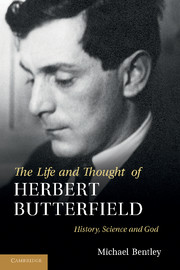Book contents
- Frontmatter
- Contents
- List of illustrations
- Acknowledgements
- List of abbreviations
- Note on manuscript sources
- Introduction
- PART I PRIVATE INTELLECTUAL 1900–1945
- PART II CONTOURS OF AN ORIGINAL MIND
- PART III PUBLIC INTELLECTUAL 1945–1979
- 10 Height of his powers
- 11 From history to historiography
- 12 From diplomatic history to international relations
- 13 From autumn to winter
- Further reading
- Index
12 - From diplomatic history to international relations
from PART III - PUBLIC INTELLECTUAL 1945–1979
Published online by Cambridge University Press: 03 May 2011
- Frontmatter
- Contents
- List of illustrations
- Acknowledgements
- List of abbreviations
- Note on manuscript sources
- Introduction
- PART I PRIVATE INTELLECTUAL 1900–1945
- PART II CONTOURS OF AN ORIGINAL MIND
- PART III PUBLIC INTELLECTUAL 1945–1979
- 10 Height of his powers
- 11 From history to historiography
- 12 From diplomatic history to international relations
- 13 From autumn to winter
- Further reading
- Index
Summary
Because of the contradictions and paradoxes involved, the realm of international relations, more than any other, is calculated to suffer at one and the same time from the cupidities of the wicked, the anxieties of the strong, and the unwisdom of the virtuous.
Herbert Butterfield… the belief that the power of man's lusts and ambitions is no more than some sub-rational impulse, which can be managed with more astute social engineering or more psychiatric help, lends an air of sentimentality and unreality to the political opinions of the modern world.
Reinhold NiebuhrPhysical journeys have their self-limiting aspect since we cannot be in two places at once. Intellectual voyages insist on no such restriction. For a mind as curious and speculative as Butterfield's, lines of enquiry into divergent subjects could run alongside one another like trains on parallel tracks. His trajectory away from ‘straight’ history and towards the history of historiography provided a master-narrative in his development and it has been right to lend it particular stress. A second destination should also command attention, none the less, because in approaching it, and then turning away again, Butterfield made a very public commitment that enhanced his status and significantly strengthened his relationship with American intellectual culture. One element in his move towards historiography had concerned a willingness to extend the geography of his interests beyond Europe in both space and time.
- Type
- Chapter
- Information
- The Life and Thought of Herbert ButterfieldHistory, Science and God, pp. 320 - 344Publisher: Cambridge University PressPrint publication year: 2011



